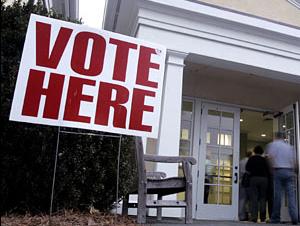Pew report calls U.S. voter registration system ‘inaccurate, costly and inefficient’
One of every eight voter registrations in the United States is either invalid or inaccurate — a new report from the Pew Center on the States reveals.
Along with voters registered in multiple states, their findings revealed that approximately 1.8 million dead people are still listed as active voters. Equally troubling is the discovery that one in four people who are eligible to vote — some 51 million people — are not registered at all.
Adam Liptak, Supreme Court correspondent for The New York Times, said the report also found that 2 million votes in the 2008 election were lost — unable to be counted because of flaws in the registration process.
On the other hand, if you look at how much retailers like Amazon or search engine giants like Google know about you, you get a sense of just how much data is out there that could help make registration easier — and more accurate, Liptak said.
“And yet we rely on these 19th century methods of getting people registered,” he said.
For most people, that means filling out a paper form and then mailing or delivering it in person to a local elections office.
The United States is one of a very few democracies around the world that make voters responsible for getting themselves registered to vote.
“It means a lot of people aren’t going to go through the effort, because it’s a pain,” Liptak said. “And the effort they do go through leads to all these errors.”
In contrast, many other countries put the impetus on the government to get citizens registered and keeping up a registry.
“All you have to do is show up at the polling place on election day. You don’t have to go through these machinations just to give yourself the opportunity to vote, which is generally thought to be guaranteed by the Constitution,” Liptak said. “There are huge databases that would allow this process to be streamlined that we don’t seem to be taking advantage of.”
But it’s hotly debated about whether making voter registration easier should even be a goal. In fact, many states are moving to make voter registration and voting harder.
“It’s not clear which way this cuts. The people who are affected by the registration problems are the highly mobile,” Liptak said. “On the one hand, that may be populations the tilt Democrat, which is poor people and students and young people. But it will also be some populations that probably tilt Republican: the military.”
But, he said, what politicians think is that getting more people registered tends to help Democrats.
“That may or may not be right, but that does seem to be driving the discussion,” Liptak said.
